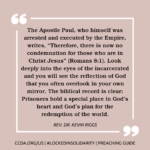You know what’s hard? Loving people. And since love is really the heart of justice, that’s even more exhausting, because it means reciprocal connection, unearthing all our baggage in relationship (accidentally or intentionally), and walking in the ways of Jesus. I’m getting tired just writing that sentence.
I can remember a difficult time in ministry, as an outreach pastor in downtown Los Angeles. Our teams had grown exponentially, and I was struggling to manage my church responsibilities alongside the growth, leaders, partnerships, and my relationships with the people we were reaching. (Getting tired again.) I became disappointed with myself, with others, and after a situation between two young women from Skid Row I was mentoring dissolved the mentorship entirely, I was so discouraged. I was two years into my marriage, and we had our first major fight about how my job was taking over every part of my life. I was filled with grief and wrecked with questions.
What’s the point of all this? Am I even making a difference? Are we moving the needle on anything? Is my leadership effective? Does anyone in the church even care what we are doing? Will I ever stop bringing my husband my emotional scraps? How will we ever have children? Do I even want to raise children in this crazy world? Why did I ever decide to wake up to what’s happening below the surface in this city––is all this effort even worth it? Collaboration is so difficult––why am I always the glue trying to hold it all together?
I learned through that season, that if we do not allow ourselves space to grieve the harsh realities we see, and if we do not deal with our disappointment quickly, we can become resentful and angry, even dishonest in our personal relationships. I don’t know about you, but sometimes I forget how to relate to normal people. This is a pretty terrible happy hour/dinner/“Hi honey, I’m home” conversation starter: “Rough day at the office, since I’ve been knee deep in the issues of children being trafficked in our city, and I have seen things so vile I can’t even tell you about them. And have you read The New Jim Crow? Because I’ve been up every night for a week, full of anger and heartbreak. I’ve seen institutionalized racism up close and personal in prisons, and I don’t know what to do about it. Also, there were helicopters again last night over our house for an hour, and when I called LAPD, they told me to lock my doors and stay away from windows, because they’re looking for a murder suspect one street over. And in my CERT training, I learned the big one’s coming, so we need to start developing our neighborhood emergency earthquake plan.”
That being said, it’s quite easy in our line of work to bury the pain somewhere deep inside, to carry the secondary trauma without even realizing it, to live in a constant state of fatigue and to show up to events, to our marriage and friendships, even to our workplace a bit absent, and dare I say it, numb. It’s quite easy to work for Jesus and never actually work with Him in a way that alleviates our burden.
Thankfully, during this difficult season, I met some of the CCDA leaders in Los Angeles. I attended a Base Camp training for catalytic leaders that Dr. Mary Glenn was hosting, and I exhaled sitting in a room of people that I didn’t have to explain myself to or perform for, because they were in the trenches with individuals and institutions and knew what it was like to manage partnership and faith, leadership and personal life. One of the first times I showed up, we wrote our own psalm of lament, and as I poured out my heart, God put a crack in the shell of protection I had built around my person in a futile attempt to just deal with it all. I began a process of transformation (again), and I want to share with you a few practical ways I changed:
- I repented. I was crushed when the Lord revealed the pride, control and anger in my life, and I sorrowfully apologized. I admitted to myself and to God, that I was not in control, and never would be. Jesus holds it all together, not me. I am responsible for my own choices, not the choices of others.
- I worked at flipping my energy output on its head. I realized I gave my best energy to the teams I was leading, to the people I mentored, to those I was pastoring, and it was hurting my marriage and friendships. I was married then, no longer single, and my husband (and now family) deserves my best, not my scraps. We instituted a date night and a Sabbath, and whatever work didn’t get done just didn’t get done. People were mad and disappointed in me, but my marriage and intimacy with my husband continued to thrive.
- I started accountability with four women in my life. On a weekly basis, we asked questions like: Do you like the person you are becoming? Is your heart for God shrinking or growing? Are you giving your family your emotional scraps? Is the pace of your life sustainable? You can find the accountability questions we use by clicking here.
- I found support. Finding other faith leaders working in community development was a game changer. I felt understood and it gave my pain a healthy outlet. We need like-minded individuals if we are going to pursue justice for all in a sustainable context.
- I got help. I have done counseling, support groups, recovery groups in the past, but during this season, I found a spiritual formation director and met with her once a month, and it was revolutionary! Turns out, I was serving a bit of a dictator in my heart, instead of the real Jesus, who is gentle and compassionate and loving. I discovered I am the beloved of Christ, with nothing attached to it, and that is enough. If I never did another thing for Jesus, His love would remain the same.
- I shared more meals with friends. The table is sacred, and as we broke bread together, I could feel the brokenness in my soul working its way back towards wholeness. As we laughed, cried, shared, prayed, with no agenda except to love God and love each other, the truth that I am not alone solidified in my heart.
- I allowed myself to change. As I gave myself freedom to grow into the woman God was inviting me to become, I felt afraid, but I did it afraid. I let go of who I had been in the past, of my accomplishments, of the standards in my mind, even of the church community I had grown up in, and it was all by His leading. I gave up the resistance, found greater joy and fulfillment, and have come to love the way I am changing.
Friend, as you co-labor with Christ and with others, I pray you feel the tangible presence of the Holy Spirit refreshing you and reviving your heart. As you risk taking off your mask in your marriage, family and safe friendships, I pray you are met with such overwhelming grace and love, that you are found in the rest and peace of Jesus.
We are looking forward to hosting you at this year’s CCDA National Conference in Los Angeles. It is our desire to serve as a catalyst in your life, as you journey with Christ and with each other.
Additional Resources: The Rest of God by Mark Buchanan; Savor by Shauna Niequist; Dr. Soong-Chan Rah’s Video Teaching on Lamentations; The Very Good Gospel by Lisa Sharon Harper; Out of Sorts by Sarah Bessey
Ashley is passionate about transformation in people, communities and neighborhoods. She is committed to developing sustainable solutions to felt needs through a restorative justice model, through partnership and collaboration, and desires to see change at both the individual and institutional level. Ashley discovered this passion over the 14 years she lived in Los Angeles, where she met and married her husband Cody, and birthed their little boy, Levi. The Abercrombies currently live in Brooklyn, NY and pastor together on Wall Street at Liberty Church’s downtown community. They’re committed to building a strong marriage, raising a family in an urban city, eating their way through New York, and inviting everyone they can to the table. There’s always room for more. Connect with Ashley by visiting her blog: www.ashabercrombie.org




